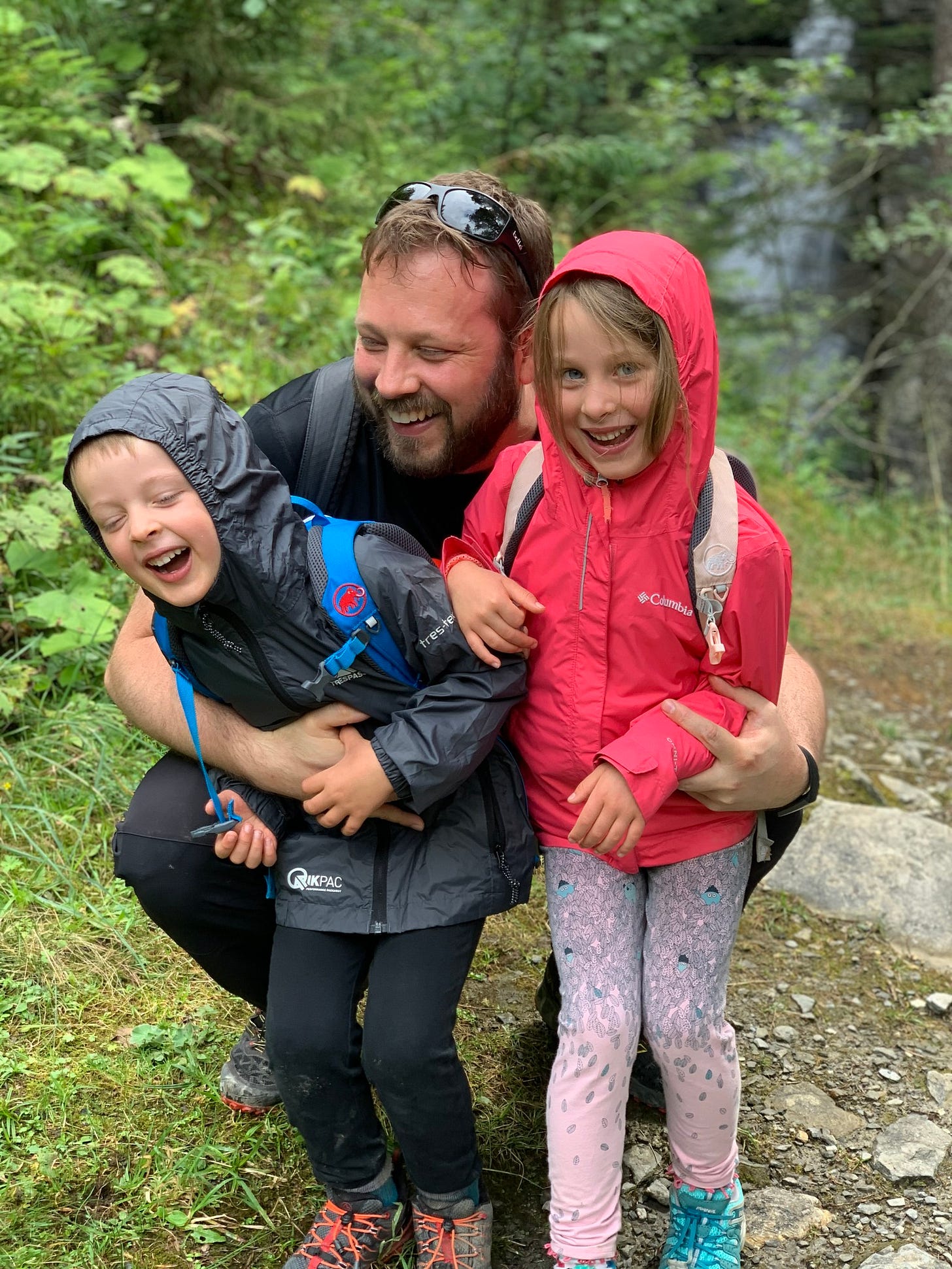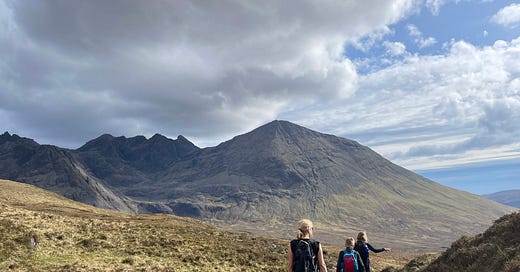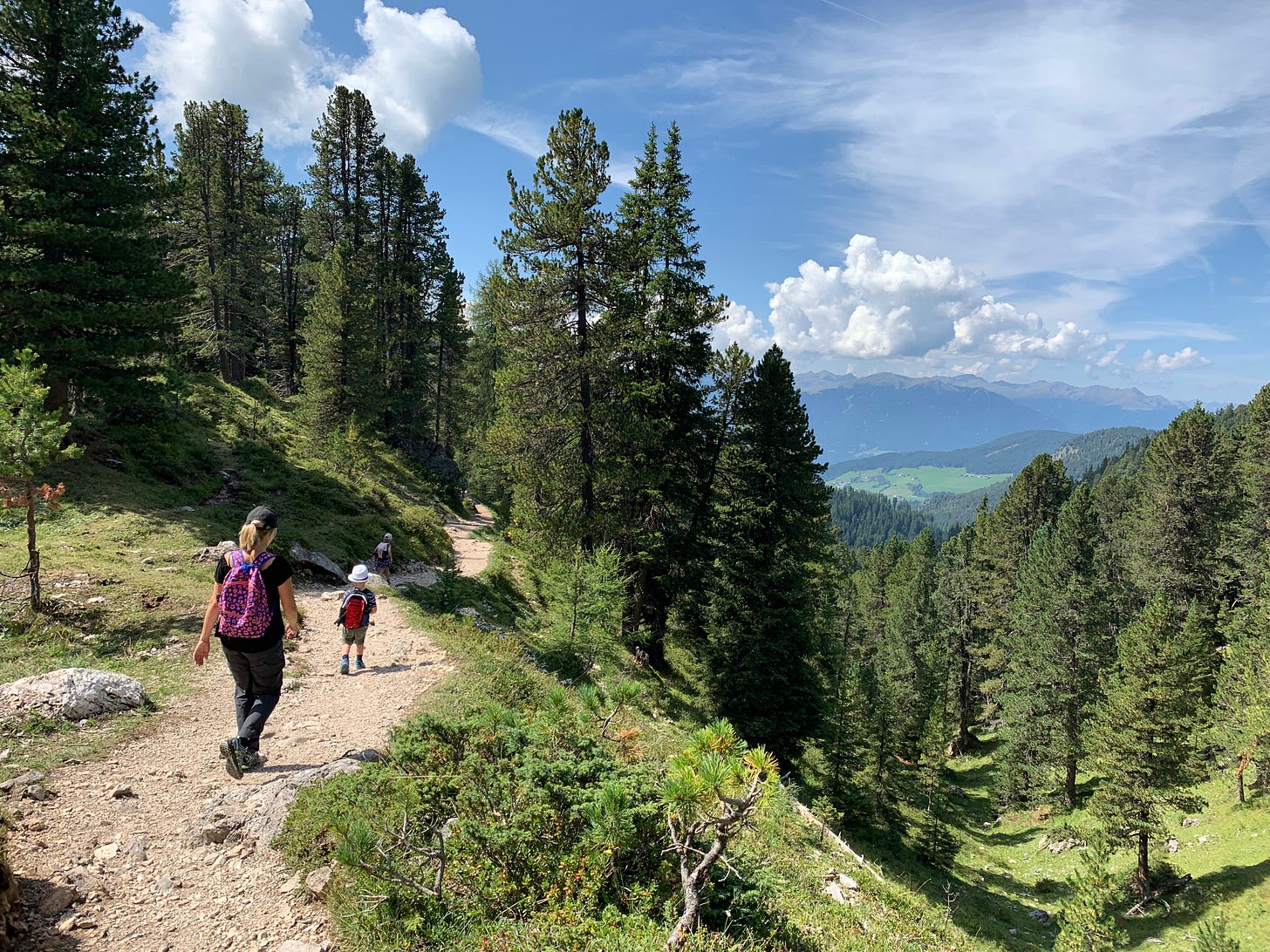The powerful concept of RELATIVE LUXURY and the immense joy hidden within it.
The extremely powerful mechanism that turns outdoor experiences into the best memories of your life and how tremendous effort can lead to the most exquisite of joys.
A few weeks ago, during one of those dinners where it’s just the kids, me (My wife Laura works in the evenings), and some elaborate dish I’ve prepared (because what else do I have left in life besides cooking?), the conversation turned to my son Raphael's incredible memory. His earliest memory is the moment when Laura broke our flat screen TV back when we were living in France, and he was barely three years old (a story in itself).
Just for the sake of it, and to see what he would say, I asked him, “Raphael, what’s been the best moment of your life so far?” I expected him to take some time to think and answer, but he shot back immediately: “That time we were waiting for you on that mountain top in Scotland, waiting for you to come back from the other mountain.” I was a bit shocked that he said it so quickly and so clearly, as if he had already thought about it and decided that was the best moment of his life. A child who just turned eight years old.
The time he refers to is a 40-minute window when Laura and the kids waited at the summit of a Munro called “Druim Shionnach,” while the crazy me ran to conquer the peak of another Munro, “Creag a’Mhaim,” which had a somewhat treacherous approach. Since 2018, I’ve been trying to get to Scotland once a year to climb more and more of the 282 peaks called “Munros” — mountains over 3,000 feet, some relatively easy to climb, and some very tough, even murderous. Usually, I do this alone or with very experienced trekkers, but this year I did it with Laura and the kids.
Overall, on this trip to Scotland, which was probably the best vacation of my life, Laura and the kids conquered 7 Munros, and I climbed 9. Raphael's best moment in life came after a steep 740-meter ascent, mostly without a defined path, some of it involving scrambling (hands and feet) over steep rocks.
While I went to the second peak, Sivan and Raphael rebuilt and added stones to the cairns that mark the way to the summit. It was a relatively clear day, with lots of wind, and after this summit, we climbed three more (much harder and steeper) before descending back down to the valley. Altogether, that day, Laura and the kids walked 21.5 kilometers and ascended 1,492 meters.
Back to that dinner — when I asked Sivan what the best moment of her life was, she recalled a moment from three years ago in the French Alps, in the Sixt-Fer-à-Cheval area. Also on a mountain summit, when she was six years and one month old. And she also shot out the answer immediately, without thinking at all.

And then, suddenly, I realized something.
You know, sometimes you can go through your whole life doing something you love, without being able to explain why you do it or why you love it so much. A while ago, I wrote a post in Hebrew that got loads of likes on Facebook - “Why I Hike,” but now when I reread it, I see that what I was really saying was that I don’t truly know why I do it.
That conversation with my kids, suddenly made me come to a very clear understanding of why hiking has become the center of my life. So much so, that I decided to dedicate a large portion of my time and effort to making the tedious and difficult planning of such outdoor adventures easy and simple for everyone.
I thought I was part of the tourism industry, but in fact, I’m in the memory-making business. Everything clicked for me suddenly because over the past few weeks, I’ve been talking a lot with future users of what i’m building, and one of them is a father who wanted to take his son on a “Bar Mitzvah trek” in the Alps. I realized that our conversation, which was mostly about logistics like the right gear, booking huts, etc., was really about how memorable this trek would be. He wanted to ensure it would be a special experience that his son would have with his father, one that he would never forget.
So no, his son won’t ever forget that trek. Once, I went on a hike with my father in the Hilazon Wadi under Karmiel when I was about seven, and we crossed the Hilazon River and climbed “Har HaLamed” on some random Saturday afternoon. I still remember every detail: the glow of the sunlight, the effort, the cool water in the canteen, and my father’s silences.
“That moment when the suffering ends and the small comfort begins — that’s true luxury.”
We form good memories from many things. How many birthdays have you celebrated? How many times have you gone to this or that restaurant? To this or that hotel? Vacations in Paris, vacations in Rome? In New York? Or just sat and ate watermelon by the beach with friends. Every one of those things turns into this thick, pleasant nostalgic soup of pleasant and vague memories. But challenging hikes in the wilderness are something else entirely. It’s a different beast. The thing that makes memories from hikes and treks so strong, the thing that carves those moments onto your being - is the challenge and the difficulty. A dear French friend sent me a piece from an interview with one of the greatest French adventurers of all time, Sylvain Tesson, where he talks about exactly this point:
“If you eat a simple meal at the entrance of a cave, after it took you 10 hours of hard walking to reach it, it will be nothing less than a feast fit for kings. On the other hand, if you eat lobsters in molecular emulsions inside a champagne Jacuzzi at some five-star hotel, it will be nothing more than a flood of meaningless, tasteless luxury. I’m completely indifferent to sophisticated luxury, but I have an insane admiration for relative luxury — that is, luxury that comes from the end of hardship — a fire you light after a walk in the cold — it’s unbelievable! It’s insane luxury! Give me all the champagne in the world, give me marble baths with gold faucets filled with donkey milk, and it won’t interest me as much as drinking cool water after great thirst. That moment when the suffering ends and the small comfort begins — that’s true luxury. Opening a tent and sleeping dry after a whole day of walking in the rain — that’s worth more than any fancy five-star hotel.”
I don’t know of a mechanism more efficient in this world at creating amazing and extraordinary memories than a hike in nature or a trek. Small children get this intuitively on their own. The fact that my son is nostalgic for moments when his small hands collected stones and built a cairn while waiting for his father and the wind was blowing hard, competing with the deceptive Scottish sun — is a mind-blowing realisation for me. These are the breathtaking images that people remember in their final moments of life. The reason they are remembered so well is that you had to work for them, physically.
Apparently, there is some scientific evidence that physical activity enhances memory. I don’t know of any study that went deep into the mechanism that actually “registers” memories and how (if ever) physical effort improves this “memory recording process”. For now, I have only subjective assumptions to work with but I think that anyone that has been doing some substantial effort outdoors in nature would absolutely relate and agree with Tesson’s words.






Thanks for sharing. I fully emphasize with the message . My family's greatest memories come from our 'hikers group' that spent plenty of hours exploring the cricks and peaks of nature. And now I get to see with pride and satisfaction the groen up kids go hiking in Bolgaria, while their friends go partying.
One caveat is that like many other things in life, this appreciation and joy need to be built, preferably during childhood.